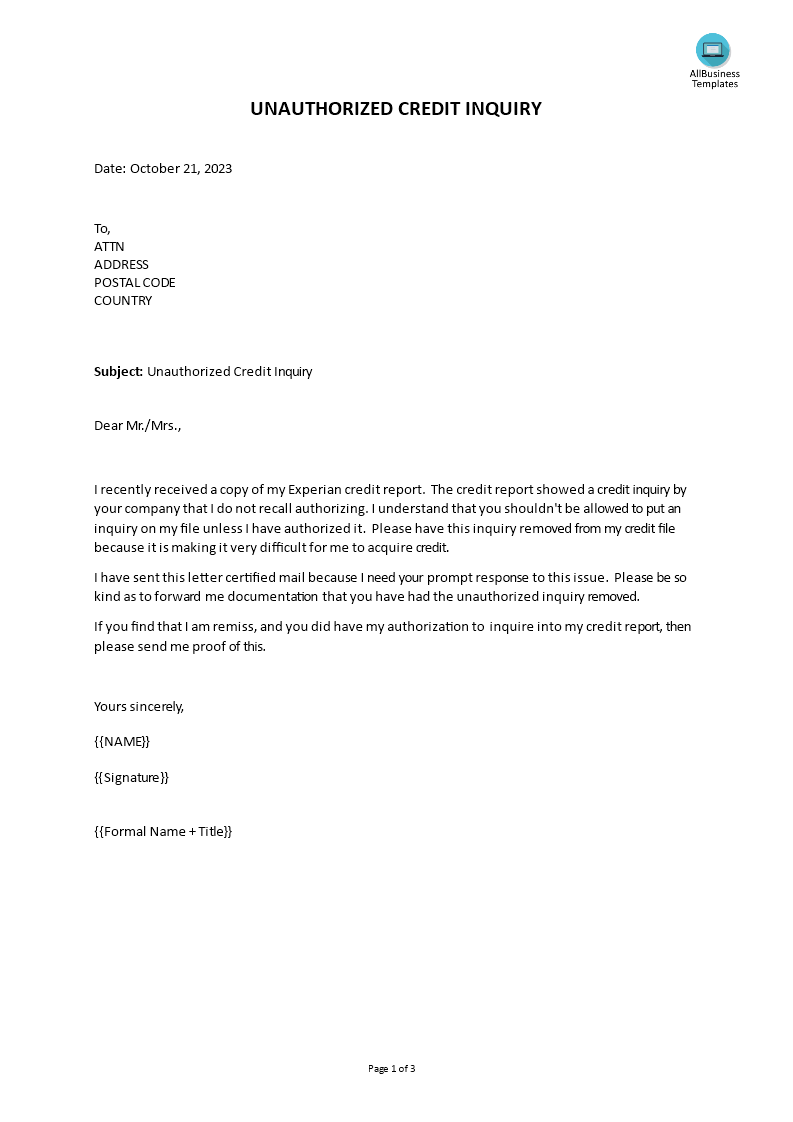Unauthorized Credit Inquiry
Sponsored Link高级模板 保存,填空,打印,三步搞定!

下载 下载 How to make an unauthorized credit inquiry? In what way is an unauthorized credit inquiry different from a legitimate inquiry? this Unauthorized Credit Inquiry financial template now!
只有今天: USD 1.49
点击购买

可用的免费文件格式:
微软的词 (.docx)- 本文档已通过专业认证
- 100%可定制
- 这是一个数字下载 (29.02 kB)
- 语: English
- 付款完成后,您将收到包含该文件的电子邮件。
Sponsored Link
How to make an unauthorized credit inquiry? In what way is an unauthorized credit inquiry different from a legitimate inquiry? We have a sample template available that can help you create a solid credit inquiry policy. Our templates are tailored to fit the needs of businesses from a variety of industries and can be customized to suit your needs. Download this unauthorized credit inquiry financial template now!
It's essential to monitor your credit reports regularly to identify any unauthorized inquiries and address them promptly. If you discover an unauthorized credit inquiry, you should take the following steps:
An unauthorized credit inquiry, also known as a hard inquiry or hard pull, occurs when a third party, such as a lender, creditor, or service provider, accesses your credit report without your permission or without a legitimate reason. These inquiries are typically made when you apply for credit, such as a loan, credit card, or mortgage. Creditors and lenders use these inquiries to assess your creditworthiness and make lending decisions.
Unauthorized credit inquiries can have several negative implications:
- Credit Score Impact: Hard inquiries can lower your credit score. Each hard inquiry typically results in a small decrease in your score, and multiple unauthorized inquiries can add up, potentially causing a significant drop in your credit rating.
- Credit Report: Unauthorized inquiries will appear on your credit report, and they may signal to future creditors that you have recently sought credit, which can affect their perception of your financial stability.
- Identity Theft Concerns: Unauthorized inquiries may be a sign of identity theft or fraud. If you did not apply for credit with a particular lender or authorize an inquiry, it's important to investigate and take steps to protect your identity and credit.
- Challenges in Future Credit Applications: Excessive hard inquiries can make it more challenging to secure new credit. Lenders may view multiple inquiries as a sign of financial distress or overextension, which can result in higher interest rates or credit denials.
It's essential to monitor your credit reports regularly to identify any unauthorized inquiries and address them promptly. If you discover an unauthorized credit inquiry, you should take the following steps:
- Contact the Creditor or Lender: Reach out to the creditor or lender responsible for the unauthorized inquiry. Ask them for an explanation and request that they remove the inquiry from your credit report if it was made in error.
- Dispute with Credit Bureaus: File a dispute with the credit reporting agencies (Equifax, Experian, and TransUnion). They can investigate the inquiry and remove it from your report if it is found to be unauthorized.
- Place a Fraud Alert or Credit Freeze: If you suspect identity theft, consider placing a fraud alert or credit freeze on your credit reports. These measures can help protect your credit and prevent further unauthorized inquiries.
- Monitor Your Credit: Continue to monitor your credit reports regularly for any unusual activity or unauthorized inquiries.
Unauthorized credit inquiries can be a sign of identity theft, so it's essential to take them seriously and address them promptly. By staying vigilant and taking appropriate actions, you can protect your credit and financial well-being.
Download this professional finance Unauthorized Credit Inquiry template now!
DISCLAIMER
Nothing on this site shall be considered legal advice and no attorney-client relationship is established.
发表评论。 如果您有任何问题或意见,请随时在下面发布
相关文件
Sponsored Link
